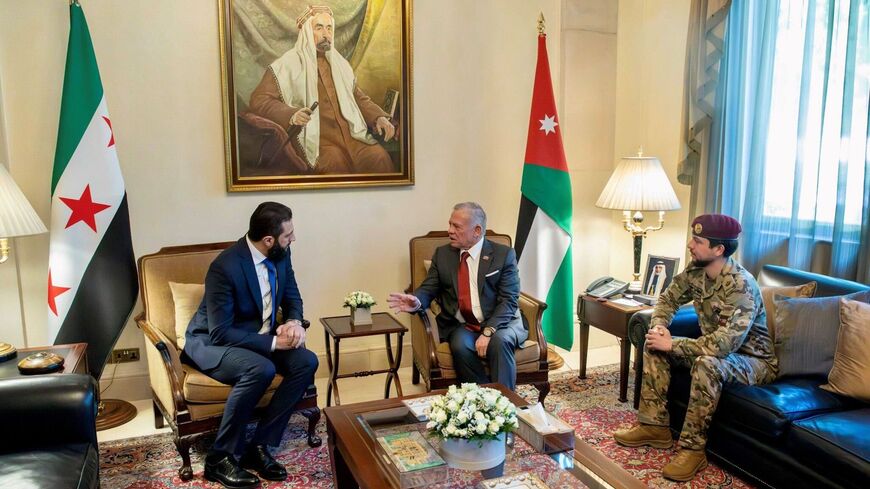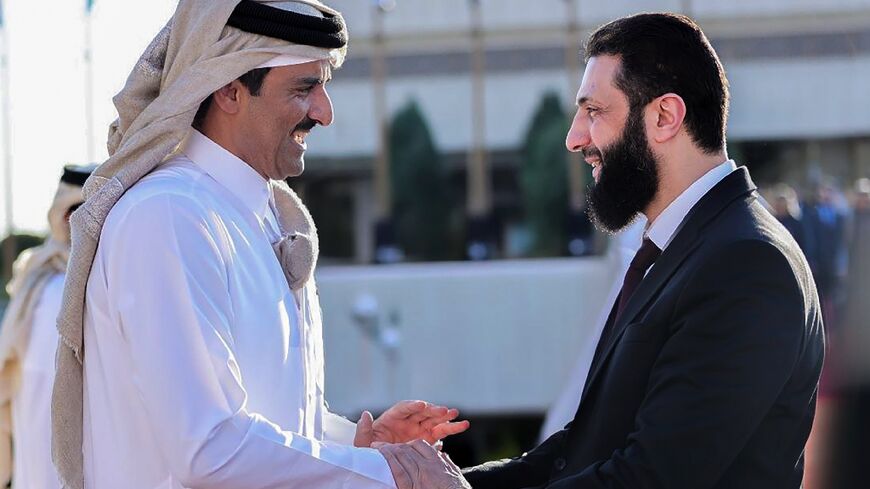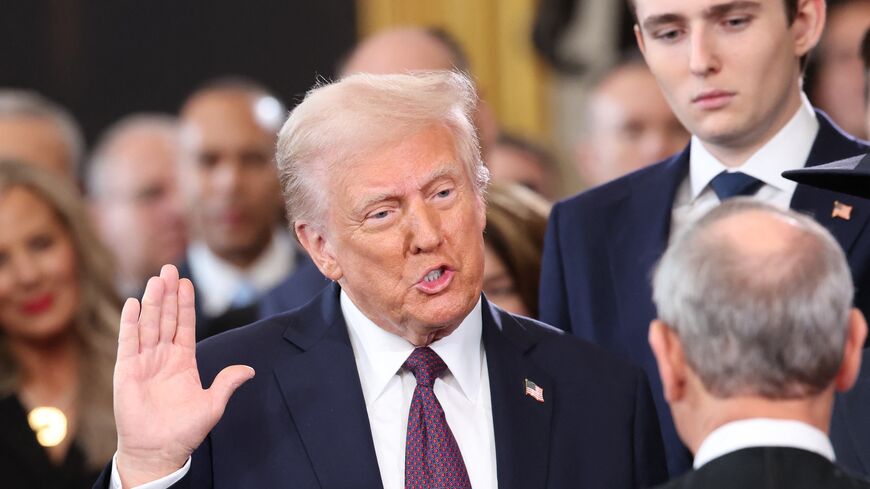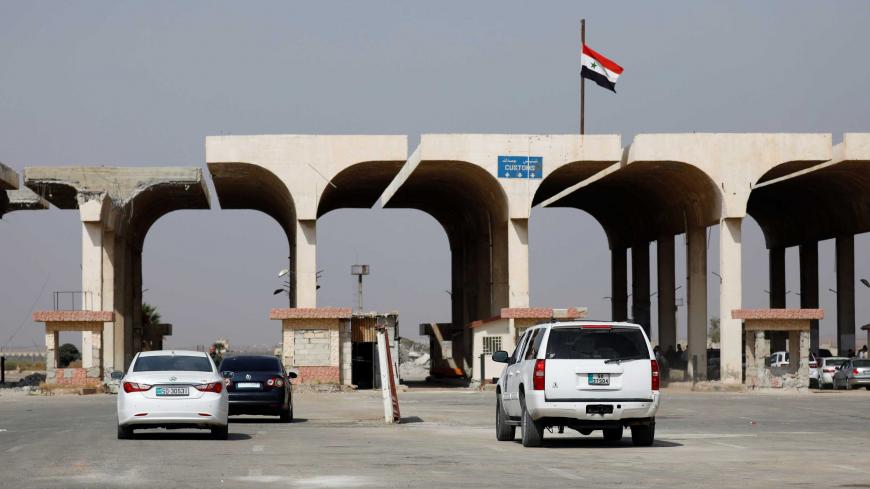UAE, Saudi Arabia congratulate Sharaa as Jordan resumes Syria flights
Arab leaders have warmly welcomed Ahmed al-Sharaa as Syria's interim president, with close allies of his deposed predecessor remaining noncommittal.
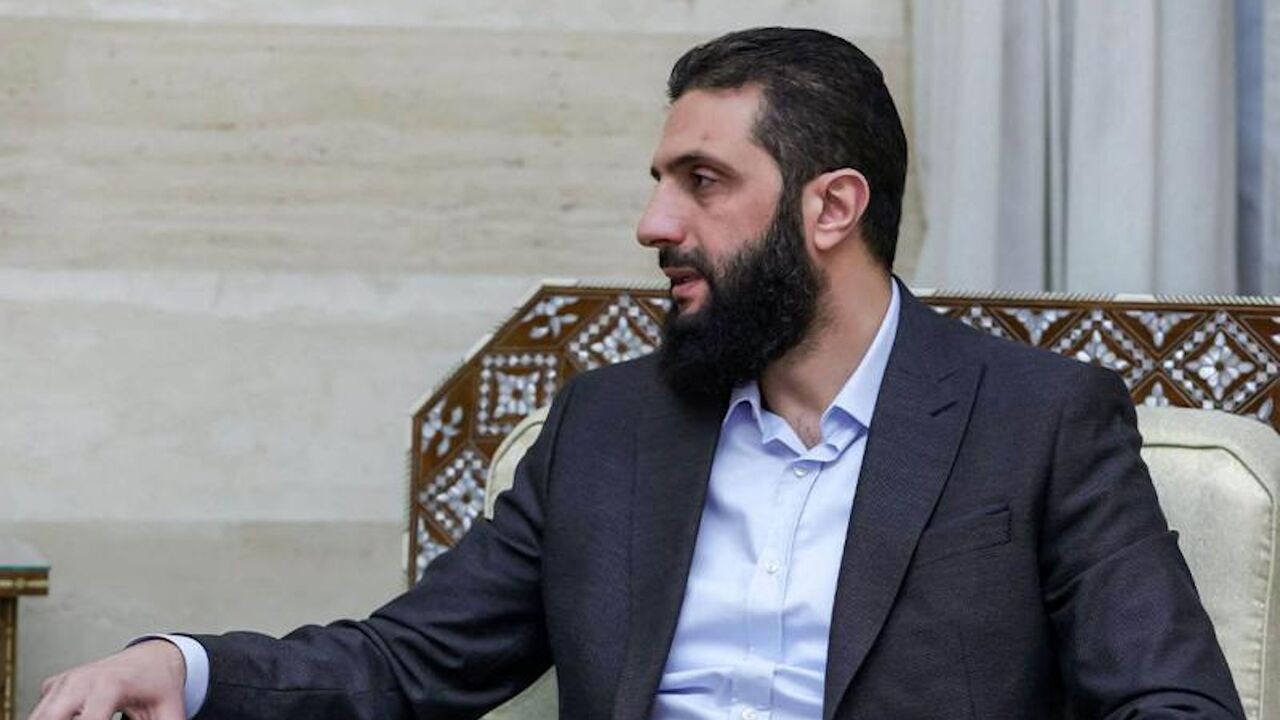
Royal Jordanian Airlines resumed commercial flights to the Syrian capital on Friday after a 13-year hiatus.
The inaugural flight to Damascus carried Samer Majali, vice chairman and CEO of Royal Jordanian, and Razan al-Jabarat, the airline’s executive director of corporate communications. Their plane, which took off from Amman, landed at the Damascus International Airport on Friday morning, according to Petra, Jordan's state-run news agency.
The Jordanian national carrier said in a statement to state media that it will schedule four flights a week to Damascus, “with the aim of providing air connectivity for the Syrian market with countries around the world.”
Majali was cited by state-owned Al-Mamlaka TV as saying that Royal Jordanian plans to implement daily flights in April, the goal being to support Syria's reconstruction by improving its connections internationally and to enhance economic and trade relations between Syria and Jordan.
The resumption of flights comes almost two months after the fall of President Bashar al-Assad on Dec. 8, following a swift rebel offensive led by the Islamist militia Hayat Tahrir al-Sham (HTS). Royal Jordanian announced its decision to resume direct Amman–Damascus flights on Jan. 16 and also issued a statement from Majali thanking the new authorities in Syria for facilitating the resumption of the flights.
In 2012, one year into the civil war in Syria, Royal Jordanian announced the suspension of the two daily flights it operated to Damascus and Aleppo, citing the “unrest” in the country.
The Jordanian government backed the rebels against Assad’s forces at the onset of conflict, but later adopted a neutral position as the war dragged on. Periods of strain and rapprochement marked Jordanian-Syrian relations throughout the conflict.
Jordan was one the countries in the region most affected by the Syrian conflict. Its 233-mile border with Syria through desert has been the site of attempted narcotics smuggling into Jordan, which has accused members of the deposed Syrian government and its allied Iranian militias of involvement in the cross-border operations.
The instability in Syria affected the Jaber border crossing, the only passenger and commercial route between Syria and Jordan, which had been a lifeline for both countries before the outbreak of the civil war.
After armed rebels took control of southern Syria in April 2015, Jordanian authorities closed the crossing, fearing a spillover of violence onto its territory. The crossing reopened in 2018 but experienced repeated closures, the most recent one due to the rebel offensive late last November. Operations resumed on Dec. 18, after Assad’s fall.
Jordan currently hosts around 1.3 million Syrians, according to official figures, with around 730,000 registered with UNHCR, the UN Refugee Agency.
Between Assad's departure and Dec. 26, some 18,000 Syrians returned home, according to the Jordanian government. In a Thursday meeting in Amman with UN High Commissioner for Refuges Filippo Grandi, Jordanian Foreign Minister Ayman Safadi stressed the need to create suitable conditions to allow Syrians to return home voluntarily.
The Jordanian Foreign Ministry, after Assad's overthrow, had expressed the kingdom’s readiness to provide “all possible support to the Syrian people in their efforts to rebuild their homeland.”
Arab leaders welcome new counterpart
On Thursday, Jordan’s King Abdullah II congratulated Ahmed al-Sharaa, leader of HTS, on assuming the presidency of Syria.
The Jordanian monarch sent Sharaa a cable wishing him success in leading Syria and serving its people. He also reaffirmed Jordan's support for Syrian unity, security, and stability and stressed its commitment to boosting bilateral cooperation and backing for the Syrian people.
A conference of military commanders from various factions declared Sharaa Syria’s interim president on Wednesday in Damascus.
Sharaa, formerly known by the nom de guerre Abu Mohammad al-Golani, has sought to end Syria’s isolation in the international arena and rebrand HTS by engaging with regional and Western actors in a flurry of diplomatic activity.
Several leaders in the region have congratulated Sharaa on his new appointment. Saudi Arabia’s King Salman and Crown Prince Mohammed bin Salman each sent congratulatory cables. The king wished Sharaa success in leading Syria “toward a prosperous future that achieves the aspirations of the Syrian people.”
Saudi Foreign Minister Prince Faisal bin Farhan led a high-level delegation to Damascus last week, as the kingdom moves to reassert itself in the region amid the waning influence of Iran.
Sheikh Mohamed bin Zayed Al Nahyan, president of the United Arab Emirates, sent Sharaa a congratulatory cable, as did other UAE leaders, including Prime Minister Sheikh Mohammed bin Rashid Al Maktoum, and Vice President and Deputy Prime Minister Sheikh Mansour bin Zayed Al Nahyan.
The UAE earlier this month hosted Syrian Foreign Minister Asaad Hassan al-Shibani in Abu Dhabi, where the discussion involved “brotherly ties” between their countries.
In recent years, the UAE and Saudi Arabia — which backed various rebel factions during the Syrian civil war — had led efforts to restore Arab relations with Syria under Assad and were instrumental in pushing for its reinstatement in the Arab League in May 2023
Qatar’s emir, Sheikh Tamim bin Hamad Al Thani, on a visit to Syria on Thursday, congratulated Sharaa in person.
In separate cables of congratulations, Sultan Haitham bin Tariq of Oman and Kuwait's emir, Sheikh Meshal Al Ahmad Al Jaber Al Sabah, wished Sharaa success in his mission to lead Syria toward stability.
Quiet former allies
Meanwhile, Iran and its proxies, which backed Assad and his forces throughout the civil war, have not commented on Sharaa’s appointment specifically.
In an interview with Al-Jazeera from Doha on Thursday, Iranian Foreign Minister Abbas Araghchi said Iran will support any government approved by the Syrian people, stressing the need to preserve their country's stability and its territorial integrity. He did not mention Sharaa by name or make additional comments.
Russia has remained silent about Sharaa’s new appointment, as it continues to scramble to retain its military bases in Syria, with Assad, Moscow's former regional ally, having fled to Moscow, along with his family, after the rebel takeover of Damascus.
A high-level Russian delegation visited Syria this week, the first since Assad's fall, to discuss the naval base in Tartous and the Khmeimim air base, near the port city of Latakia. The delegation met with several Syrian leaders, including Sharaa.
On the occasion of the visit, the Syrian leadership said in a statement, “The new administration . . . stressed that restoring relations must address past mistakes, respect the will of the Syrian people and serve their interests.”
Several unconfirmed reports claim the Syrians have asked Russia to extradite Assad. Asked by reporters on Wednesday about such a request, Kremlin spokesman Dmitry Peskov declined to respond.

